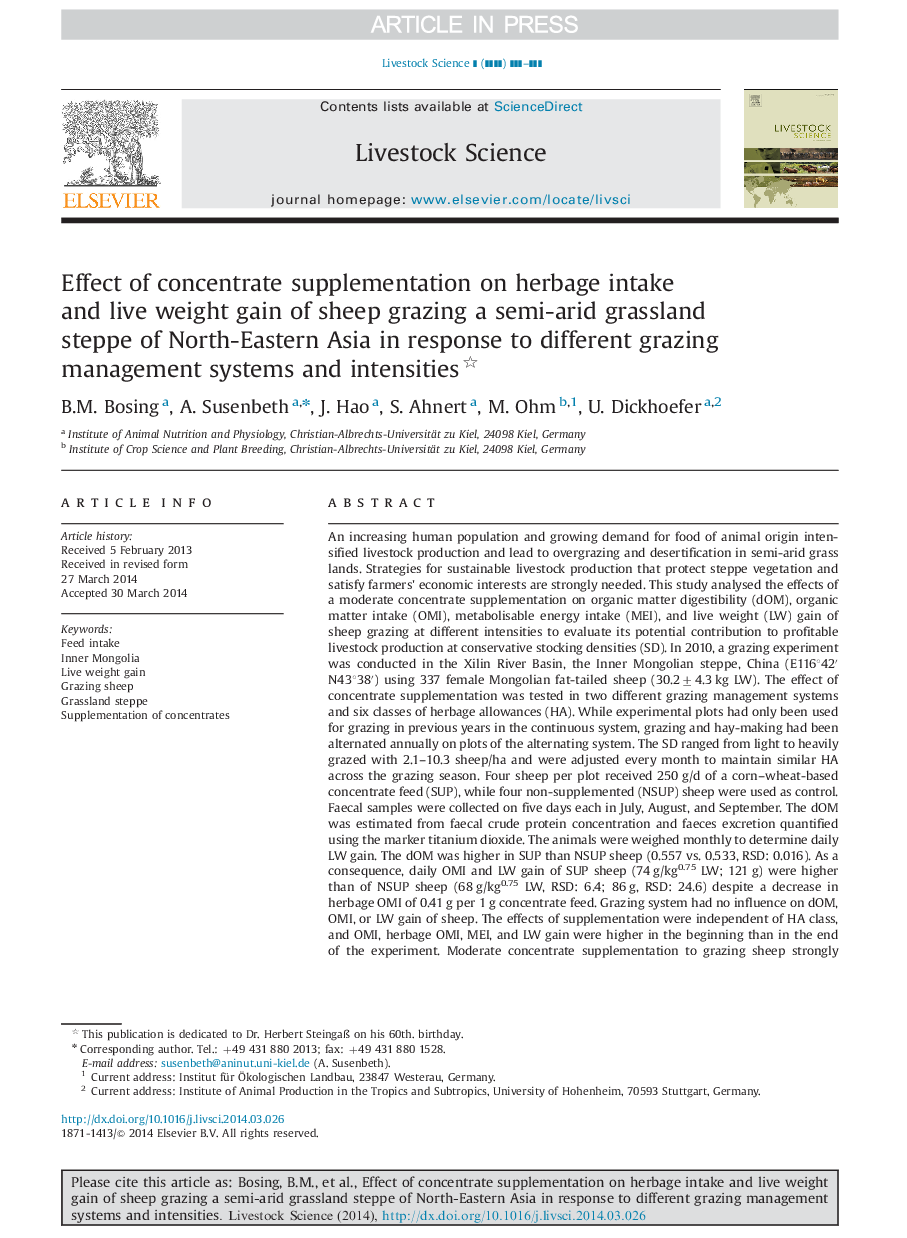| کد مقاله | کد نشریه | سال انتشار | مقاله انگلیسی | نسخه تمام متن |
|---|---|---|---|---|
| 8502227 | 1553967 | 2014 | 10 صفحه PDF | دانلود رایگان |
عنوان انگلیسی مقاله ISI
Effect of concentrate supplementation on herbage intake and live weight gain of sheep grazing a semi-arid grassland steppe of North-Eastern Asia in response to different grazing management systems and intensities
ترجمه فارسی عنوان
اثر مکمل کنسانتره بر مصرف علوفه و افزایش وزن زنده گاو گوسفند در مرحله استراحتی نیمه خشخاش شمال شرقی آسیا در پاسخ به سیستم های مختلف مدیریت چراوری و شدت
دانلود مقاله + سفارش ترجمه
دانلود مقاله ISI انگلیسی
رایگان برای ایرانیان
کلمات کلیدی
مصرف خوراک، مغولستان داخلی، افزایش وزن زنده، گاو گوسفند، گاوآهن استپ، مکمل کنسانتره
موضوعات مرتبط
علوم زیستی و بیوفناوری
علوم کشاورزی و بیولوژیک
علوم دامی و جانورشناسی
چکیده انگلیسی
An increasing human population and growing demand for food of animal origin intensified livestock production and lead to overgrazing and desertification in semi-arid grasslands. Strategies for sustainable livestock production that protect steppe vegetation and satisfy farmers׳ economic interests are strongly needed. This study analysed the effects of a moderate concentrate supplementation on organic matter digestibility (dOM), organic matter intake (OMI), metabolisable energy intake (MEI), and live weight (LW) gain of sheep grazing at different intensities to evaluate its potential contribution to profitable livestock production at conservative stocking densities (SD). In 2010, a grazing experiment was conducted in the Xilin River Basin, the Inner Mongolian steppe, China (E116°42â² N43°38â²) using 337 female Mongolian fat-tailed sheep (30.2±4.3 kg LW). The effect of concentrate supplementation was tested in two different grazing management systems and six classes of herbage allowances (HA). While experimental plots had only been used for grazing in previous years in the continuous system, grazing and hay-making had been alternated annually on plots of the alternating system. The SD ranged from light to heavily grazed with 2.1-10.3 sheep/ha and were adjusted every month to maintain similar HA across the grazing season. Four sheep per plot received 250 g/d of a corn-wheat-based concentrate feed (SUP), while four non-supplemented (NSUP) sheep were used as control. Faecal samples were collected on five days each in July, August, and September. The dOM was estimated from faecal crude protein concentration and faeces excretion quantified using the marker titanium dioxide. The animals were weighed monthly to determine daily LW gain. The dOM was higher in SUP than NSUP sheep (0.557 vs. 0.533, RSD: 0.016). As a consequence, daily OMI and LW gain of SUP sheep (74 g/kg0.75 LW; 121 g) were higher than of NSUP sheep (68 g/kg0.75 LW, RSD: 6.4; 86 g, RSD: 24.6) despite a decrease in herbage OMI of 0.41 g per 1 g concentrate feed. Grazing system had no influence on dOM, OMI, or LW gain of sheep. The effects of supplementation were independent of HA class, and OMI, herbage OMI, MEI, and LW gain were higher in the beginning than in the end of the experiment. Moderate concentrate supplementation to grazing sheep strongly increases LW gain of individual animals and might offer a valuable contribution to increase individual productivity, maintaining the output per area at lower SD. A reduced herbage OMI alleviates grazing pressure and can thus maintain long-term grassland productivity.
ناشر
Database: Elsevier - ScienceDirect (ساینس دایرکت)
Journal: Livestock Science - Volume 165, July 2014, Pages 157-166
Journal: Livestock Science - Volume 165, July 2014, Pages 157-166
نویسندگان
B.M. Bösing, A. Susenbeth, J. Hao, S. Ahnert, M. Ohm, U. Dickhoefer,
